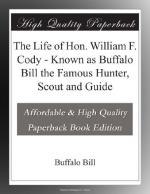My brother was a great favorite with everybody, and his death cast a gloom upon the whole neighborhood. It was a great blow to all of the family, and especially to father who seemed to be almost heart broken over it.
Father had been greatly disappointed at the failure of his California expedition, and still desired to move to some new country. The death of Samuel no doubt increased this desire, and he determined to emigrate. Accordingly, early in the spring of 1852, he disposed of his farm, and late in March we took our departure for Kansas, which was then an unsettled territory. Our outfit consisted of one carriage, three wagons and some fine blooded horses. The carriage was occupied by my mother and sisters. Thus we left our Iowa home.
[Illustration: Samuel’s fatal accident.]
Father had a brother, Elijah Cody, living at Weston, Platte county, Missouri. He was the leading merchant of the place. As the town was located near the Kansas line father determined to visit him, and thither our journey was directed. Our route lay across Iowa and Missouri, and the trip proved of interest to all of us, and especially to me. There was something new to be seen at nearly every turn of the road. At night the family generally “put up” at hotels or cross-road taverns along the way.
One day as we were proceeding on our way, we were met by a horseman who wanted to sell his horse, or trade-him for another. He said the horse had been captured wild in California; that he was a runner and a racer; that he had been sold by his different owners on account of his great desire to run away when taking part in a race.
The stranger seemed to be very frank in his statements, and appeared to be very anxious to get rid of the animal, and as we were going to Kansas where there would be plenty of room for the horse to run as far as he pleased, father concluded to make a trade for him; so an exchange of animals was easily and satisfactorily effected.
The new horse being a small gray, we named him “Little Gray.”
An opportunity of testing the racing qualities of the horse was soon afforded. One day we drove into a small Missouri town or hamlet which lay on our route, where the farmers from the surrounding country were congregated for the purpose of having a holiday—the principal amusement being horse-racing. Father had no trouble in arranging a race for Little Gray, and selected one of his teamsters to ride him.
The Missourians matched their fastest horse against him and were confident of cleaning out “the emigrant,” as they called father. They were a hard looking crowd. They wore their pantaloons in their boots; their hair was long, bushy and untrimed; their faces had evidently never made the acquaintance of a razor. They seemed determined to win the race by fair means or foul. They did a great deal of swearing, and swaggered about in rather a ruffianly style.




